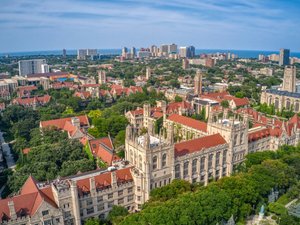
Startup incubator 1871 has arguably one of the largest influences over Chicago’s tech ecosystem. Whether it’s hosting events for the community or coaching budding entrepreneurs on how to build a sustainable business, much of the city’s tech culture and its successes have origins at 1871.
Just this year, 1871 was ranked first in the world among university-affiliated business incubators—one reason why its top position is such a prominent one. For more than five years, Howard Tullman sat at the helm as CEO, directing the show at 1871 and becoming a Chicago tech legend of sorts.
Now that he’s moved on to other things, Betsy Ziegler has taken over. Her first day on the job was April 2, and now nearly four months later, she’s settling into the position, which she describes as “fast and furious.”
“Every day has been different from the day before,” Ziegler says during an interview in June at her office at 1871. “It’s been a very high-energy, action-packed, first 90 days.”
Before joining 1871, Ziegler had spent seven years at Northwestern University’s Kellogg School of Management, most recently as its chief innovation officer for portfolio innovation. Prior to that, she worked in financial services at McKinsey and Co.
Though she didn't expect her career would take her to a place like 1871, Ziegler is no stranger to startup culture. Shortly after joining Northwestern in 2011, she became an angel investor in the area, giving her first check to Chicago-based fashion startup Trunk Club.
Now in her new position at 1871, she’s focusing on how to build on the legacy that the incubator has created for itself. During her first few months, Ziegler has been getting to know her team and spending time out in the community, visiting the other incubators, like mHUB, Blue Lacuna and MATTER.
She says that she meets with four to five 1871 startups a week, giving mentorship, feedback and help as they need it. Nearly 500 startups are working out of 1871 right now and about 250 of its alumni companies are still operating.
“[I] feel very good about the list and how many people had their origin story here,” Ziegler says.
On average, startups stay in 1871 for 10-20 months. The incubator, which operates on a nonprofit model, charges startups a monthly fee that gives them access to workspace, mentors, events and the venture capital firms that have offices right upstairs. Fees range from $125 to $600.
“With that fee, you’re getting … this commitment from us to help you be a successful entrepreneur,” Ziegler says. “You don’t have to have customers or revenue before you come here, but you have to have real clarity about what problem you’re trying to solve.”
This summer, Ziegler says 1871 has welcomed 30-40 new members every week, which includes not only startup founders, but also 1871 team members and interns. Besides memberships, 1871 supports itself through grants and corporate sponsorships, its annual momentum awards dinner and revenue from events.
"Chicago is a great place to build a company."
As Ziegler has been getting familiar with her new role, she has identified what she’d like to work on as it pertains to 1871’s greater impact on Chicago tech. She is looking for ways to better leverage the 150 Fortune 500 companies throughout the Midwest that 1871 has corporate partnerships with. And she’s also working to establish more relationships with community and entrepreneurial organizations on the city’s South and West sides as a way to connect with disadvantaged entrepreneurs.
“We believe that talent is everywhere but opportunity and access is not,” Ziegler says.
As diversity in tech remains a pressing topic throughout Chicago’s ecosystem, 1871 has created programs to make sure that all their members, regardless of backgrounds, have access to resources. There’s LatinX, an accelerator for Hispanic entrepreneurs, and WiSTEM, which is a similar program but designed for women founders. Ziegler says about 30 percent of the founders at 1871 are women.
“We’re doing a great job, but there’s so much more we can be doing,” Ziegler says. “I am fully committed to working as hard as we can to reflect the world around us, so that’s gender, race and socioeconomic background.”
But of all the tasks on her plate, Ziegler says the most vital is helping to boost Chicago’s profile as a national and even global tech hub. Ziegler says she’s working with other tech leaders to narrow down what the city’s top-down tech story really is.
Chicago is known for growing B2B tech companies, which can at times cause the city to be overlooked compared to the coasts, where entrepreneurs tend to build flashier consumer startups. Ziegler says though it may appear like it’s more difficult to raise money and build a company in the Windy City, that’s not really the case.

“Chicago is a great place to build a company,” Ziegler says. “Whether or not the capital is being allocated to all the right places is a totally different question, but there’s plenty of capital.”
Ziegler says to enhance Chicago’s profile as a tech hub on a national level, the city needs its entrepreneurs to stay. If startups have big exits, causing several of its employees to have newfound financial flexibility to invest in other local startups or even launch their own businesses, the network among tech and startup leaders will strengthen. And Ziegler is focused on ensuring that network can thrive at 1871.
“[There’s been] lots of thought, time and energy around ... how we make sure that we stay ahead and that we know what the entrepreneurs are going to need before they might even know they need it," Ziegler says. “We’re just at the tipping point.”








